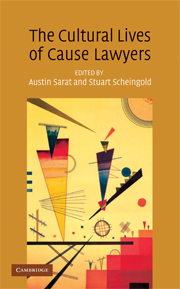Book contents
- Frontmatter
- Contents
- Acknowledgments
- Contributors
- Bringing Cultural Analysis to the Study of Cause Lawyers: An Introduction
- PART I THE CULTURAL WORK OF CAUSE LAWYERS
- PART II THE CULTURAL CONSTRUCTION OF LAWYERS AND THEIR CAUSES
- 4 “They all have different policies, so of course they have to give different news”: Images of Human Rights Lawyers in the British Press
- 5 Ed Fagan and the Ethics of Causes: Who Stole Identity Politics?
- 6 Of Windmills and Wetlands: The Press and the Romance of Property Rights
- 7 “The Kids are Alright”: Cause Lawyering on Television in 1960s America
- 8 Nothing to Believe In – Lawyers in Contemporary Films About Public Interest Litigation
- 9 “Of course he just stood there; he's the law”: Two Depictions of Cause Lawyers in Post-Authoritarian Chile
- 10 Paulina Escobar as Cause Lawyer: “Litigating” Human Rights in the Shadows of Death and the Maiden
- PART III THE CULTURAL RECEPTION OF LAWYERS AND THEIR CAUSES
- Index
10 - Paulina Escobar as Cause Lawyer: “Litigating” Human Rights in the Shadows of Death and the Maiden
Published online by Cambridge University Press: 08 January 2010
- Frontmatter
- Contents
- Acknowledgments
- Contributors
- Bringing Cultural Analysis to the Study of Cause Lawyers: An Introduction
- PART I THE CULTURAL WORK OF CAUSE LAWYERS
- PART II THE CULTURAL CONSTRUCTION OF LAWYERS AND THEIR CAUSES
- 4 “They all have different policies, so of course they have to give different news”: Images of Human Rights Lawyers in the British Press
- 5 Ed Fagan and the Ethics of Causes: Who Stole Identity Politics?
- 6 Of Windmills and Wetlands: The Press and the Romance of Property Rights
- 7 “The Kids are Alright”: Cause Lawyering on Television in 1960s America
- 8 Nothing to Believe In – Lawyers in Contemporary Films About Public Interest Litigation
- 9 “Of course he just stood there; he's the law”: Two Depictions of Cause Lawyers in Post-Authoritarian Chile
- 10 Paulina Escobar as Cause Lawyer: “Litigating” Human Rights in the Shadows of Death and the Maiden
- PART III THE CULTURAL RECEPTION OF LAWYERS AND THEIR CAUSES
- Index
Summary
“To worry or to smile, such is the choice when we are assailed by the strange; our decision depends on how familiar we are with our own ghosts.”
– Julia Kristeva, Strangers to Ourselves“At first, it is something you simply don't talk about. Then it occurs to you that people whose houses are broken into or who are mugged in Central Park talk about it all the time. Rape is a much more serious crime. If it isn't my fault, why am I supposed to be ashamed? If I shouldn't be ashamed, if it wasn't “personal,” why look askance when I mention it?”
– Susan Estrich, Rape“If he's innocent, then he's really fucked.”
– Paulina Escobar, Death and the MaidenIntroduction
The world of popular cinema presents the unique possibility for reimagining the world of cause lawyering. It does so especially when the film in question is a complex, emotionally powerful morality tale, such as Roman Polanski's adaptation of the celebrated Ariel Dorfman play, Death and the Maiden. Although the film superficially presents its central figure Paulina Escobar (played by Sigourney Weaver) as victim – indeed, there can be no doubt that her character has experienced profound victimization at the hands of a ruthless, patriarchal state (i.e., one that condones rape and torture) – viewing the film as metaphor for the long, hard struggle toward emancipation from a world once marked by fascist control and the taken-for-granted rape culture that sustains it, Paulina's character takes on new dimension.
- Type
- Chapter
- Information
- The Cultural Lives of Cause Lawyers , pp. 278 - 294Publisher: Cambridge University PressPrint publication year: 2008



